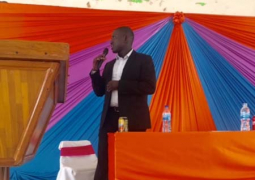
Mrs Min Whee Kang, the UNICEF Country Representative in The Gambia, has bemoaned that some 121 million children in the world today never see the inside of a classroom; they are deprived of their fundamental right to education; they are deprived of having wonderful teachers and mentors, and the vast majority of these out-of-school children are girls.
Mrs Whee Kang made these remarks at the13th annual Speech and Prize Giving ceremony of
Ranging the numbers of children attending Lower Basic, Upper Basic, and Senior Schools, the UNICEF Representative said 185, 651 children are registered in 425 Lower Basic schools, 63,182, children in 145 Upper Basic schools, and 31, 946 children in 55 Senior Schools, all totalling to 280,779. At current rate, NER is projected to be of 80% by 2015. According to her, UNICEF promotes education for all children with a special focus on girl's education because there are so many crises and calamities facing children from wars and conflicts, hunger and disease, poverty and the pandemic of HIV/AIDS. She stated that it is precisely to deal with such pressing issues of the world in an effective and sustainable manner that UNICEF believes that the world needed to focus on girls' education.
She made reference to a forward to the State of the World's Children Report in 2004 by the then United Nations Secretary General, Mr Kofi Annan, which partly reads: ".to educate a girl is to educate the whole family. And what is true of families is also true of communities and ultimately, whole countries." She went on to advance the view that if poverty eradication is the primary challenge of sustainable development, then basic education, particularly of girls, is unquestionably the surest and fastest way to reach the objective.
The UNICEF Representative acknowledged that while there is commitment to education for all children, girls' face much greater obstacles and discrimination in getting educated than boys. "Indeed, girls from poor families face a double jeopardy, the deprivation caused by poverty and the disadvantage of being treated as a less valued child," she observed, adding that that was why Kofi Anna reminded world leaders at the Millennium Summit in 2000 that there could be no significant or sustainable transformation in societies and no lasting reduction in global poverty until girls receive the basic quality education they deserve and take their rightful place as equal partners in development.
Mrs Whee Kang emphasised the right to education as "a key factor to reducing poverty and child labour and promoting democracy, peace, tolerance and development."



